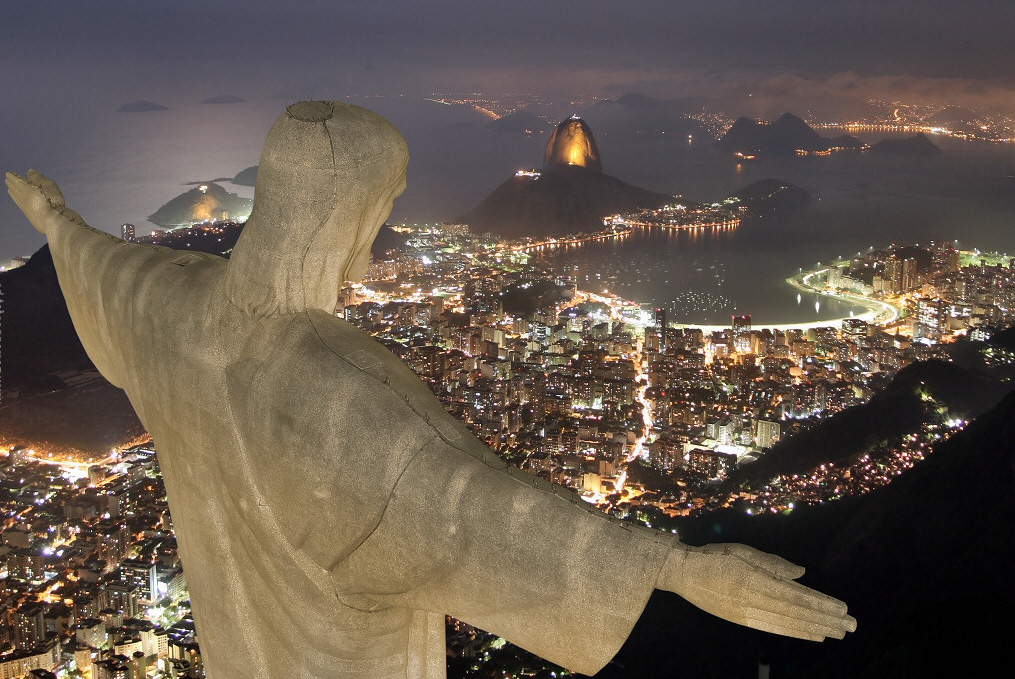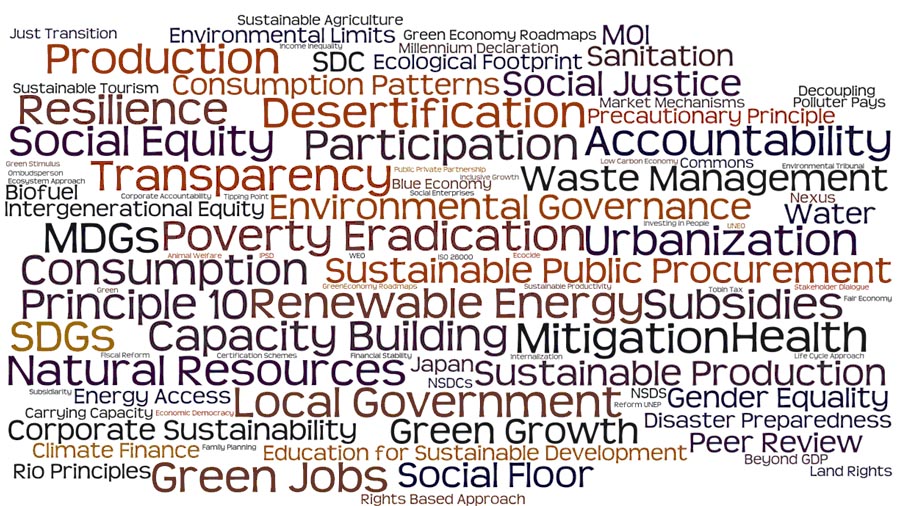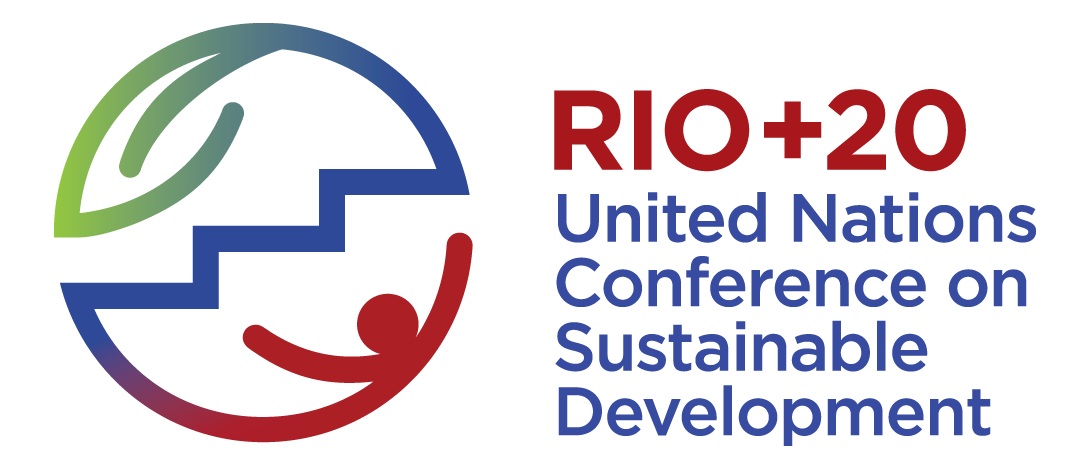
|
Rio de Janeiro: Il Cristo Redentore |
||||||||
|
|
LO STAKEHOLDER FORUM PER RIO+20 Rio de Janeiro, 4-6 giugno 2012 |
I DOCUMENTI DEL NEGOZIATO
La prima versione "Zero Draft" del documento finale di Rio+20
Rioplustwenties "Rio+20 Participation Guide - An
introduction for children
and youth"Risoluzione ONU 64/236 del 24 dicembre
2009
La Roadmap ONU delle NGO verso Rio+20 del 2011
La posizione dell'UNCTAD: "The road to Rio+20 for a development-led green economy" del 2011
Rapporto di sintesi del primo Intersessional Meeting CSD del gennaio 2011
La proposta del Presidente del Brasile
"Global Environmental Outlook"
Il Sommario per gli operatori politici del febbraio 2012
Le 21 criticità per l'ambiente nel ventunesimo secolo del febbraio 2012
Keeping Track of our Changing Environment: From Rio to Rio+20
Documento del Consiglio Ambiente del 9 Marzo 2012: "Rio+20: Pathways to a sustainable future"
Il Contributo Europeo alla UNCSD per la preparazione dello Zero Draft del Documento finale di Rio+20
Il documento del Consiglio Europeo dei Ministri dell'Ambiente del 10 ottobre 2011
La risoluzione del Parlamento Europeo del 29 settembre
La Mozione del Comitato ENVI del Parlamento Europeo per una posizione unitaria su Rio+20
La posizione della Commissione Europea del giugno 2011
ITALIA
Il Piano d'Azione Ambientale per lo sviluppo sostenibile
RIO+20 sul WEB
ENI: Verso la Conferenza Rio+10
Lo
Stakeholder
Forum
è un'organizzazione
internazionale
per promuovere
lo sviluppo sostenibile
e la democrazia
a livello globale
che mira a
migliorare le
decisioni
internazionali
sullo sviluppo
sostenibile con
un approccio
aperto,
responsabile e
partecipativo
attraverso il
coinvolgimento degli stakeholder
nei processi
intergovernativi.
Si propone di
fornire un ponte
tra coloro che
hanno un interesse
nello sviluppo
sostenibile, e i
forum
internazionali in cui
vengono prese le
decisioni in
loro nome.
Lo Stakeholder Forum è stato fondato nel 1987 dall'UNEP, il Programma delle Nazioni Unite per l'Ambiente e lo Sviluppo del Regno Unito (UK UNED). L'organizzazione continua a svolgere questa funzione, ma è stata rinominata Forum nel 2000 dai soggetti interessati ad un futuro sostenibile. Lo Stakeholder Forum sta giocando un ruolo chiave nella preparazione e il follow-up del vertice mondiale sullo sviluppo sostenibile del 2002 ed è la principale organizzazione mondiale per il coinvolgimento degli stakeholder e di sensibilizzazione verso il Summit della Terra 2012. è anche l'organizzazione leader per la facilitazione dei processi globali multi-stakeholder per lo sviluppo sostenibile. (> vai alla pagina del venticinquennale dello Stakeholder Forum)
***
Lo Stakeholder Forum pubblica regolarmente il resoconto del negoziato di Rio+20 e degli altri accadimenti internazionali dello sviluppo sostenibile e dei cambiamenti climatici con la rivista web OUTREACH. (>Vai alla collezione di tutti i numeri di Outreach). Nella stessa pagina è possibile in maniera semplice sottoscrivere per ricevere la rivista in posta elettronica.
***
Rio+20: Analysis of Zero Draft Submissions
Il Forum ha svolto uno studio approfondito sui materiali sottoposti alla CSD per la preparazione dello Zero draft del Documento finale di Rio+20 (> Consulta lo Zero draft nella pagina delle Nazioni Unite).
La seconda riunione del PrepCom, il Comitato preparatorio di Rio+20, ha invitato tutti gli Stati membri, le organizzazioni del sistema, e gli stakeholder a fornire contributi per iscritto entro il 1 ° novembre 2011, per l’inclusione in una compilation riassuntiva e per la preparazione dello Zero draft.
L’ analisi dei contributi è stata fatta caratterizzando i contenuti che si trovano nello Zero draft per mezzo di 97 parole chiave rilevanti per Rio+20 e determinando quali organizzazioni hanno manifestato il proprio interesse alla CSD servendosi di quel termine.
L’analisi ha tre obiettivi:
-
Aiutare le Nazioni Unite nello sviluppo delle stesure successive di un documento breve e orientato ai risultati politici che sia rappresentativo di tutti i punti di vista.
-
Creare uno strumento di informazione per aiutare tutti gli organismi delle Nazioni Unite, gli Stati membri e le altre parti interessate a trovare le organizzazioni che hanno interessi comuni; a identificare i conflitti potenziali e a fare gruppo attorno a temi chiave o partnership per Rio+20 e oltre.
-
Condividere le informazioni per aumentare l’efficacia del processo di Rio e la qualità dei documenti finali attraverso il lavoro comune.
Interessante il wording dei documenti presentati alla CSD, una figura nella quale la dimensione delle parole è proporzionale alla frequenza con la quale compaiono nei contributi (Fig. 1).
Figura. 1 Il wording dei contributi allo Zero draft secondo lo Stakeholder Forum

Il Forum ha elaborato il Database con il relativo Manuale. La lettura dell'intero documento dà un quadro esauriente della provenienza, dell'estensione e della qualità dei contributi pervenuti alla CSD.
***
Utile anche la Roadmap to Rio+20 pubblicata dal Forum.
The Stakeholder Forum Roadmap to Earth Summit 2012 Rio+20
Some key dates, events and milestones
2011
European Union Presidency: Poland Presidency of the G20 and G8: France
Chair of G77: Argentina
October 10th - 14th Joint session of the UNECE TimberCommittee and the FAO European Forestry Commission, Antayla, Turkey
October 11th - 12th Sharing Best Green Economy Practices Towards Rio+20, Warsaw Poland
October 11th - 12th Global Green Growth Forum, Copenhagen, Denmark
October 13th Global Transition 2012 New York Dialogue, New York, USA
October 14th Climate Summit for a Living Himalayas, Thimpu, Bhutan
October 19th - 20th - Regional Preparatory Meeting for Asia Pacific Region, ESCAP, Seoul, Republic of Korea
October 18th - 20th Regional Preparatory Meeting in the Arab Region, UN Economic and Social Commission for Western Asia (ESCWA) and partners, Cairo, Egypt
October 20th - 25th - Regional Preparatory Meeting, Africa Region, ECA and Partners, Addis Ababa, Ethiopia
October 10th - 21st UN Convention to Combat Desertification, Changwon City, Republic of Korea
October 25th - 27th - High-Level Expert Group Meeting on Using Green Agriculture to Stimulate Economic Growth and Eradicate Poverty, Ramat Gan, Israel
November 1st - Deadline for written contribution to zero draft of the outcome document.
November 4th - 6th - I International Forum and the II National Forum of Transformer Volunteering. Belo Horizonte, Brazil.
November 9th -11th - 10th Asia Pacific Roundtable for Sustainable Consumption and Production (APRCSP), Jakarta, Indonesia
November 16th - 18th The Water, Energy and Food Security Nexus: Water Resources in the Green Economy, Bonn, Germany
November 21st - 25th FAO Council, Rome, Italy
November 28th - 30th Nov High Level Expert Meeting on Sustainable Use of Oceans, Monaco
November 28th - December 9th UNFCCC COP-17, Durban, South Africa
December 1st - 2nd Regional Preparatory Meeting for ECE Region, Geneva, Switzerland
December 1st - 2nd or December 7th - 8th UN ESCWA, League of Arab States (LAS) and partners
December 12th - 15th Eye on Earth Summit, Abu Dhabi, UAE
December 15th - 16th 2nd Earth Summit 2012 Intersessional , New York, USA
December The 23rd regular session of Council of Arab Ministers Responsible for the Environment (CAMRE), Cairo (date tbc)
2012
European Presidency: Denmark
Presidency of G8: USA
Presidency of G20: Mexico
Chair of G77: TBC
January World Economic Forum (date TBC)
January 16th - 18th Meeting to discuss the content of the Zero Draft document (made available for all to read early January) to be convened, UN, New York - Informal informals
February 13th - 17th First informal negotiating week on the Zero Draft, UN, New York
February 27th - 29th UNEP Governing Council/Global Ministers Environmental Forum (Location TBC)
March 5th - 7th 3rd Earth Summit 2012 Intersessional, New York, USA
March 19th - 23rd Second informal negotiating week on the Zero Draft, UN, New York
March 26th - 29th Planet Under Pressure conference, London
April - Spring Meetings of the World Bank Group and the International Monetary Fund Development Committee meeting (date TBC)
April 30th - May 4th Third informal negotiating week on the Zero Draft, UN, New York
May 25th - 27th World Summit of Legislators, GLOBE International, Rio de Janeiro, Brazil
May 28th - 30th 3rd (Final) Earth Summit 2012 Preparatory Committee Meeting
May 29th - June 1st ICLEI World Congress 2012, Belo Horizonte, Brazil
June 1st - 3rd Informal Informals
June 5th - 6th World Symposium on Sustainable Development at Universities (WSSD-U-2012) Rio de Janeiro, Brazil
June 4th - 6th Earth Summit 2012
***
Stakeholder Forum and Commonwealth Secretariat launch
"A Pocket Guide to Sustainable Development Governance "
04 March 2011
 The
guide was initiated by Stakeholder Forum and the Commonwealth Secretariat in
response to the perceived ‘knowledge gap’ on the history and dynamics of
global governance for sustainable development. (>
scarica la guida)
The
guide was initiated by Stakeholder Forum and the Commonwealth Secretariat in
response to the perceived ‘knowledge gap’ on the history and dynamics of
global governance for sustainable development. (>
scarica la guida)
As the ‘institutional framework for sustainable development’ has been identified as one of the two core themes for the UN Conference on Sustainable Development (UNCSD 2012), it is hoped that the guide will provide the necessary background information on global sustainable development governance to allow both governmental and non-governmental stakeholders to familiarize themselves with the key issues more comprehensively.
As the topic of 'sustainable development governance' is potentially vast, the guide has been broken down into four distinct sections:
Concepts for Sustainable Development Governance,
Global Institutions for Sustainable Development Governance,
Reform Proposals for Sustainable Development Governance,
Processes for Sustainable Development Governance
***
Sustainable Development Governance towards Rio+20:
Framing the Debate
by Jan-Gustav Strandeneas
"Good governance at the local, national and international levels is perhaps the single most important factor in promoting development and advancing the cause of peace", (Kofi Annan, former Secretary General of the UN)
The issue of governance has become increasingly prominent at all levels over recent years - in many ways the achievement of good governance has become the major focus of international development, equal to and in some cases surpassing more specific concerns around democracy and human rights. Whilst this focus on governance has been welcome, it has presented some challenges in terms of defining what ‘good governance’ looks like – indeed, discussions around governance invariably become heated when the seemingly unobtrusive prefix ‘good’ is added as a qualifier.
There is general consensus that, whilst governance structures and processes may reflect the overriding political realities of any given context, equally systems of governance must be aspirational, forward-looking and operational, as well as adhering to a normative framework that encompasses the best qualities of democracy. As such, concepts such as participation, transparency and accountability must be at the heart of good governance.
However, with a broader acceptance of certain principles or concepts, come further development of these, or criticism, objections and substitutions. The engagement of stakeholders is an illustrative example. A stakeholder can broadly be defined as an actor with a stake in the decision-making process. Yet many claim that this word obscures power dynamics attached to levels of participation, and fails to take necessary account of the contextual power of different actors – can a multinational company be considered an ‘equal stakeholder’ alongside an NGO representing marginalised people, given the vast disparities in their existing levels of influence? Furthermore, in the case of the UNCSD there are 9 ‘Major Groups’ of civil society, though many find that this is reductionist approach that is not inclusive enough. Many have also raised questions around the effectiveness of engagement and consultation in the pursuit of ‘good governance’, whether it represents genuine collective decision-making, or is more often used as ‘window-dressing’.
Clearly there are a number of questions around what constitutes good governance, and this paper will not attempt to arrive at an all-inclusive definition on governance. Rather it will set the stage for a discussion that will explore some of the many ways in which governance is used in connection with sustainable development. It is the explicit hope that the document will inspire a range of actors to engage with the debate on international sustainable development governance, to further develop the concept, broaden its usefulness and strengthen its operability (> leggi l'intero documento).



